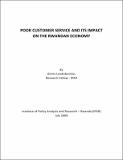| dc.description.abstract | Conditions of doing business are changing rapidly. In the last decade, the commodity market has witnessed a substantial growth and rapid change, globally as well as domestically. Customer satisfaction is critical issue in the success of any business system, hence one of the key challenges on this market, is how to satisfy and retain customers. The issue is strongly related to how service quality is managed and which holds a significant importance to customers’ satisfaction and their perceived performance of companies. In order for companies to grow and survive, they must find new ways of thinking, which has led to various marketing researches, especially those related to customer satisfaction.
The customer service research for Poor Customer Service and its Impact on the Rwandan Economy, conducted by IPAR in a span of 2 weeks in preparation for the annual Leadership Retreat, had an objective of evaluating customer satisfaction levels in Rwanda. From our findings, it emerged that 25% of tourists experienced bad customer experience during their stay in Rwanda. Rwandan customer service is seen as the worst in the East African region, which comprises of Burundi, Uganda, Tanzania and Kenya. It also revealed that service quality varies across sectors and is linked to skills, with white collar sectors generally performing better and blue collar sectors, notably transportation, remains weak in service performance.
In addition, further findings showed that the biggest problem with poor customer [service] was the lack of consumer awareness of what to expect and a cultural aversion to demanding better as among the potential causes of poor service. Consumers who have lived outside Rwanda or visited elsewhere in the region are 50% more likely to complain when they get poor service than those who have not. However, using the ‘satisfaction profit chain’ approach, it showed that if customer service were to improve significantly, it could increase the Rwandan Gross Domestic Profit (GDP), as much as $40 million a year by 2012.
The research was cross sectional in nature and aimed to provide holistic perceptive of the perceptions and expectations of the customers served by the various commodity providers in Rwanda. Our analytical approach was based on several methodologies. We collected secondary data from various documents, consulted both from private and public sectors. In regards to primary data, it consisted of several analyses. We did an analysis of customer perceptions of Rwandan hotels, restaurants and attractions as posted on TripAdvisor.com, a major user-generated tourist information website, with over 30 million subscribers. From our team of “Mystery Shoppers”, we collected primary data on customer service performance in key sectors and, lastly, we conducted a small non - representative survey, which gave us some initial insight into customer attitude and behaviour. | en |


